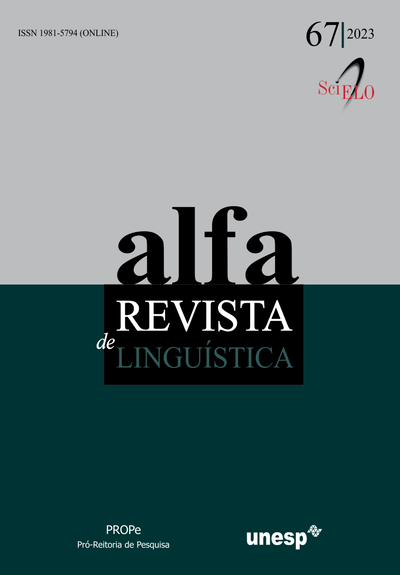Sound forms and meanings in language acquisition
listening as the holding of an enunciative place
DOI:
https://doi.org/10.1590/1981-5794-e13686Keywords:
language acquisition, enunciation, listening, phonic forms, meaningsAbstract
This study is inspired by Barthes’ (1976) contemplation of listening, dialoguing with the linguistics proposed by Émile Benveniste and its interpretations, which regard the linguist’s perspective as enunciative-anthropological (DESSONS, 2006; FLORES, 2013). The integration of these theories enabled the framing of the following questions: (1) how does the child, in their first vocalizations, hold their enunciative place of listening in the interlocutory relations with the other? (2) How does the child, in this enunciative place of listening, delimit the relation between phonic forms and meaning, in their dual – systemic and discursive – aspect? Methodologically, the study uses a child’s longitudinal language events in their first eleven months of life, selecting enunciative scenes. The following results were obtained from the analysis: evidence that the child holds their place of listening to themselves and to the other by calling upon the voice of the other, by switching between sound production and pauses in self-listening, by the way they state their position as speaker-listener, and by positing a main interlocutor in the enunciative invertibilities of emission and listening. The holding of this enunciative place enabled indications of discursive meanings and of embryos of systemic meanings of the phonic forms in the emissions to be present.
Downloads
Downloads
Published
How to Cite
Issue
Section
License
Copyright (c) 2023 ALFA: Revista de Linguística

This work is licensed under a Creative Commons Attribution 4.0 International License.
Manuscripts accepted for publication and published are property of Alfa: Revista de Linguística. It is forbidden the full or partial submission of the manuscript to any other journal. Authors are solely responsible for the article's content. Translation into another language without written permission from the Editor advised by the Editorial Board is prohibited.

